Recovery of Swiss tourism continues; growth despite Ukraine war
- News
- KOF Tourism Forecast
- Tourism
This year’s KOF Tourism Forecast is characterised by several one-off effects. For example, the Omicron wave of COVID-19 slowed the rapid recovery of the tourism sector during the winter. There are currently fewer guests from eastern Europe as a result of the war in Ukraine. In addition, the weakening of the global economy is expected to have a negative impact on tourism demand. Despite all of this, the recovery that began after the pandemic will continue and will generate growth.

The following trends are having either a positive or negative impact on Swiss tourism:
Positives:
● Summer tourism has recently been showing positive indicators: long-distance travellers from key markets (especially the UK, the US and India) are returning earlier than expected.
● KOF surveys suggest positive trends among foreign guests.
● The recovery from the COVID-19 pandemic is outweighing the decline resulting from other crisis-related effects.
Negatives:
● Russian guests are largely likely to stay away in the medium term as well.
● Given the zero-COVID policy prevailing in China, Chinese guests are not expected to return in the near future.
● The economic outlook for neighbouring European countries has been slightly revised downwards. It is expected that the consequences of the war in Ukraine will weaken these economies and cause some holidaymakers to cancel their holidays.
Switzerland has come through the crisis better than other countries
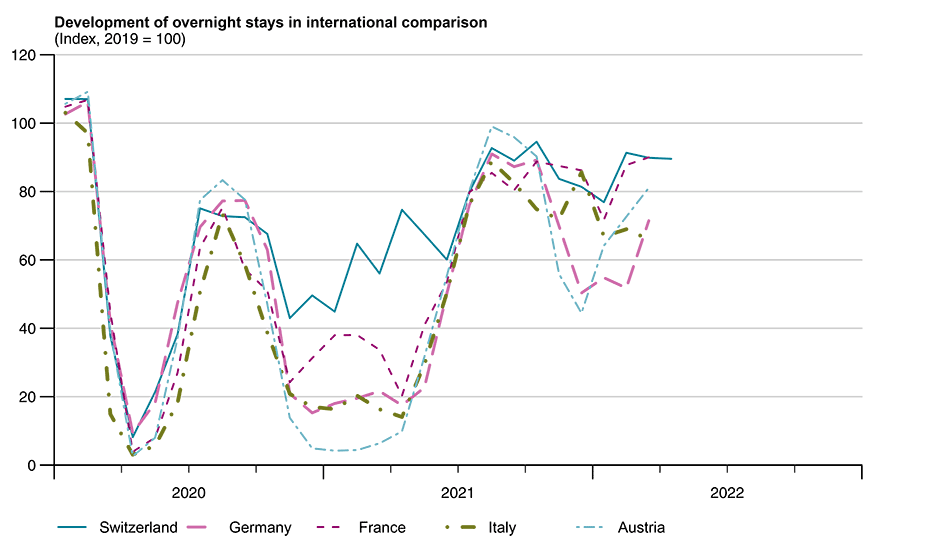
Visitor numbers returned to normal in most countries during the summer of 2021. However, the Omicron virus variant prevented a full recovery during the winter.
Austria, Germany and Italy had stricter regulations in place and required proof of vaccination and testing. France did not require any proof other than vaccination or testing, while Switzerland did not have any mandatory certification, which probably boosted the slightly higher numbers of overnight stays.
The record numbers of tourists in Switzerland were mainly attributable to domestic guests and visitors from Germany. This was despite the fact that the outbreak of the Omicron wave in winter delayed the recovery in many areas. The winter season was extremely encouraging – mainly owing to the high proportion of domestic guests.
Business Tendency Surveys predict return of long-distance travellers
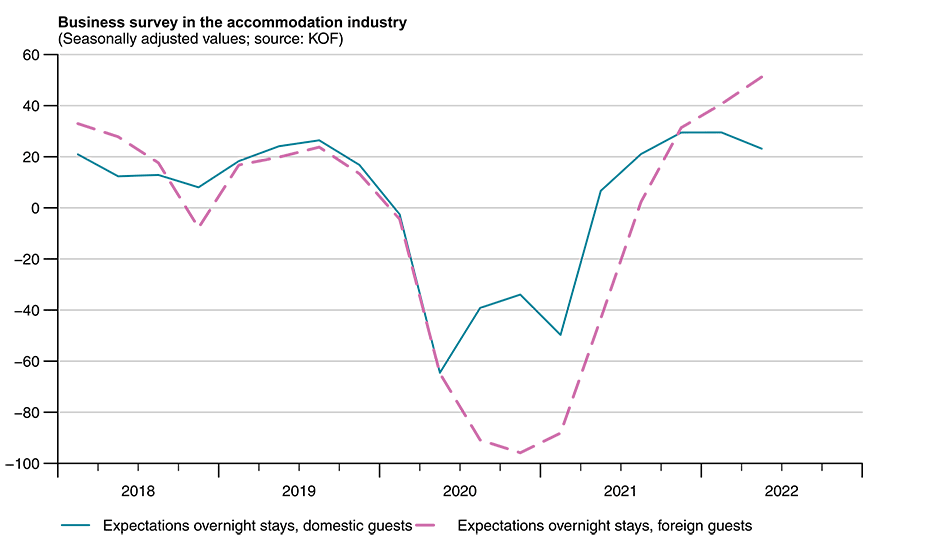
The KOF Business Tendency Surveys confirm the trend that has emerged over the past two months:
● The long-haul travel markets appear to be recovering. Foreign guests are returning in larger numbers than expected. This is reflected in the high numbers of bookings by foreign guests expected by the hospitality businesses surveyed.
● Flight movements at the airports of Geneva, Basel and Zurich have recently increased sharply. In April of this year these airports achieved an average of over 80 per cent of their pre-crisis levels. By comparison, this figure was just under 40 per cent in April 2021.
● Growth in domestic guests has declined slightly. This is because they were already at a high level.
Forecast for the summer: long-haul markets will boost the summer season
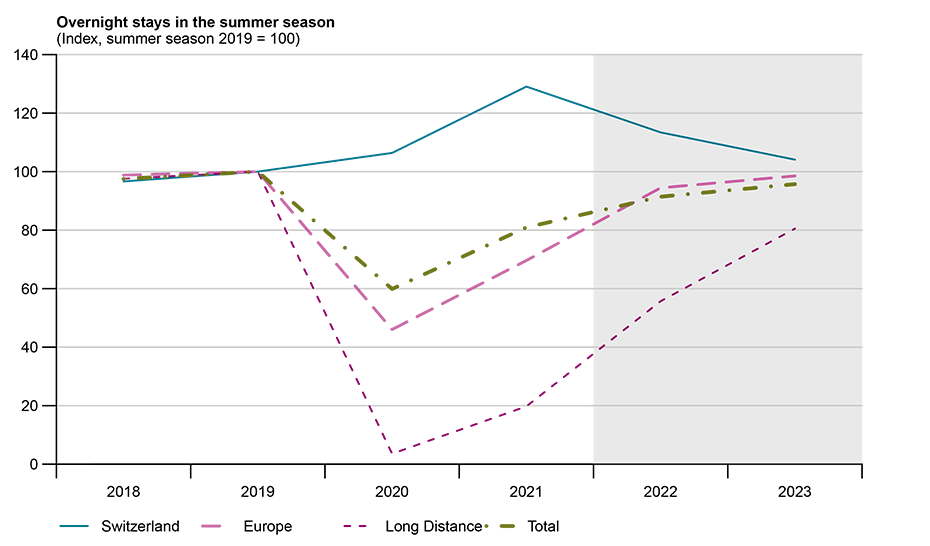
KOF is forecasting that the number of overnight stays this summer will reach 91 per cent of their pre-crisis levels. This means that the figures for the summer season will still be below their normal levels. However, this is an improvement compared with last year. The early summer in particular is expected to be significantly better.
● The number of Swiss guests will more or less return to normal after the record summer of 2021. Planning certainty and open borders should boost foreign travel.
● The numbers of overnight stays by guests from neighbouring countries will almost reach their pre-crisis levels in the summer. They are likely to be dampened by the weaker economic situation. Many guests are reacting sensitively to the economic uncertainty and are replacing expensive holidays in Switzerland with either cheaper alternatives abroad or fewer overnight stays in Switzerland.
● The long-haul markets will stabilise more than previously expected. The numbers of guests from the United States and the United Kingdom in particular have recovered more significantly in recent months than initially expected. This effect is particularly beneficial as both countries play an important role in Swiss tourism.
Forecast for the winter: the recovery is set to continue
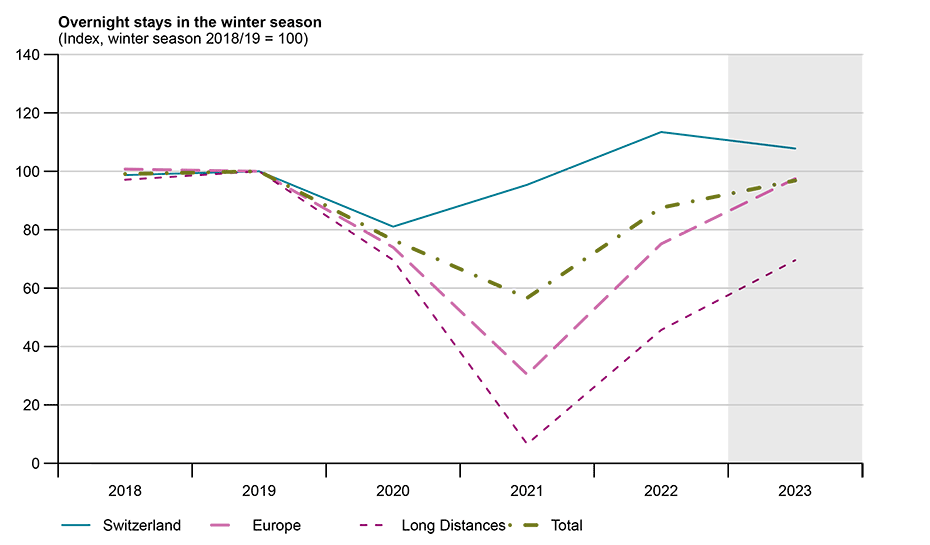
A further recovery is forecast for the winter season and is likely to reach 97 per cent of the 2019 level.
● Domestic tourism is expected to increase in the long term and to have a disproportionate effect in the winter months compared with the summer. The reasons for this are a modest shift towards more domestic tourism as well as steady population growth.
● Winter tourism is less price-sensitive than summer tourism. European guests who have spent the winter in Switzerland in the past are not likely to react very strongly to any economic slowdown. European guests are therefore likely to be close to their pre-crisis levels.
Russia: very few guests expected in the medium term
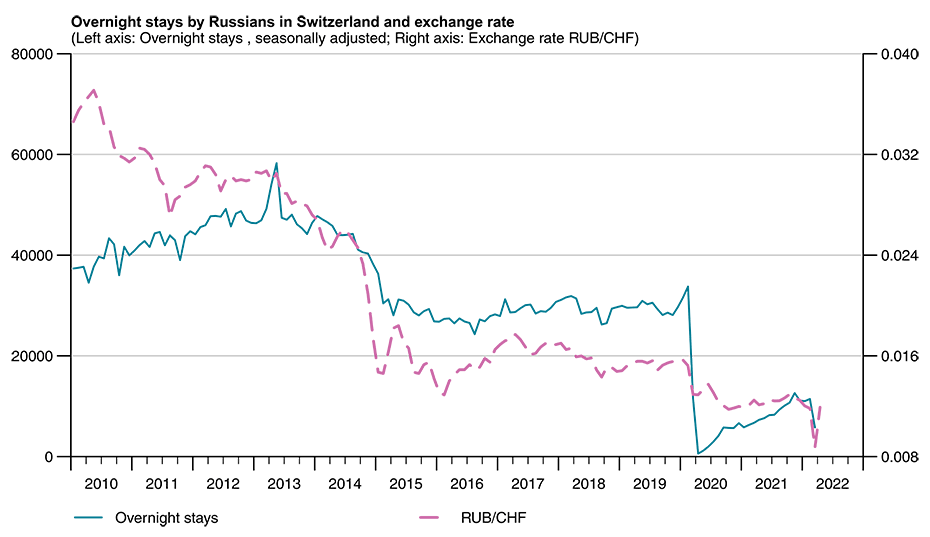
Russia was previously very important for Swiss tourist regions, especially during the holiday month of January. However, this trend has declined over the years.
The value of the rouble plummeted in 2014. This was due to the falling price of oil and the sanctions imposed by the West because of Moscow’s role in the Ukraine conflict. As the currency fell, the number of overnight stays by Russian tourists also declined. Whereas Russian guests accounted for just under 4 per cent of all overnight stays in Switzerland in January 2014, they have constituted only around 2 per cent since 2014.
Far fewer tourists from Russia are therefore expected over the long term. Entry restrictions and the anticipated decline in the rouble exchange rate will restrict tourism further.
Contact
KOF FB Konjunktur
Leonhardstrasse 21
8092
Zürich
Switzerland